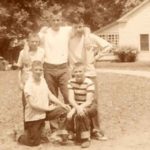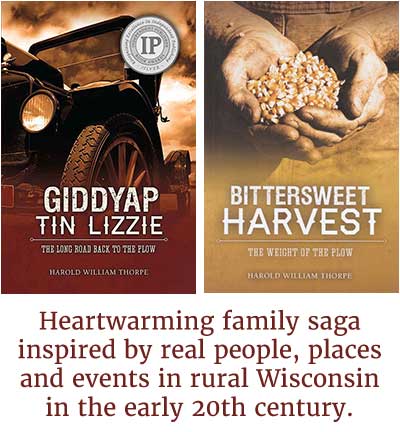I needed money if I was going to be able to continue in college the next fall. The grocery store’s modest check kept me going during winter, but I needed more than that to buy books and pay the year’s tuition. When an opportunity to work for the U.S. Department of Farm Services—through its Dodgeville office—was offered, I snapped up the job.
They paid three dollars a farm visit and told me I could probably make four visits a day. That sounded mighty good, almost twice what I’d make working a ten-hour day at the store.
I headed out the first day with four worksheets in hand and the names and locations of those four farmers. All went well. I earned my twelve dollars, but I also learned something that day. While driving to those farmers, I passed several other farmsteads that I assumed would be visited someday. Although I already knew it, I rediscovered that most farmers loved to “shoot the breeze.” I had no objection to talking— that is, until I realized that time cost me income.
Thinking about those two revelations, I recognized there might be a way to earn “real money” for next fall semester. Upon returning to Dodgeville, I drove directly to the county office with an idea in mind. I purchased a county plat book that showed where all the county’s farms were located.
I took the information that I’d acquired from the farmers that day back to my office officials. They were satisfied with my first reports but were skeptical when I asked to visit eight farmers each day instead of four. They explained that no one had made that many visits before.
I told them that I’d review my plat book that night and stop by the next morning with a list of the eight farmers that I planned to visit. They were still “Doubting Thomases,” but they said they’d have the eight worksheets ready for me.
I left home the next morning, ready to double my output from the day before. I knew that to do that, I had to be as efficient as possible. I couldn’t spend time “chewing the fat.” I had to be systematic and efficient if I was to secure the income I wanted.
My bosses were delighted when I returned that evening with eight fully completed information sheets in hand. They were surprised but happy that I’d produced the information so fast. That speeded up completion of their work, too. Thereafter, they gladly provided me with as many farmers to contact as I requested.
But they were no more delighted than I was, receiving twenty-four dollars. I’d never made that much money in a day, not even in two days. That became a most profitable summer.
But my worker colleagues weren’t happy with me. Although my systematic approach benefited me, it left them short of the contacts and income they’d expected to receive that summer. And I suspect, when farmer evaluations arrived at the office, I didn’t receive many “points” for congeniality.
I learned that good outcomes for me weren’t necessarily good for others. That’s a dilemma that our society reckons with today.
But that income enabled me to return to Platteville State Teachers College in the fall and, unexpectedly, provided enough savings so I could get married the following spring.









